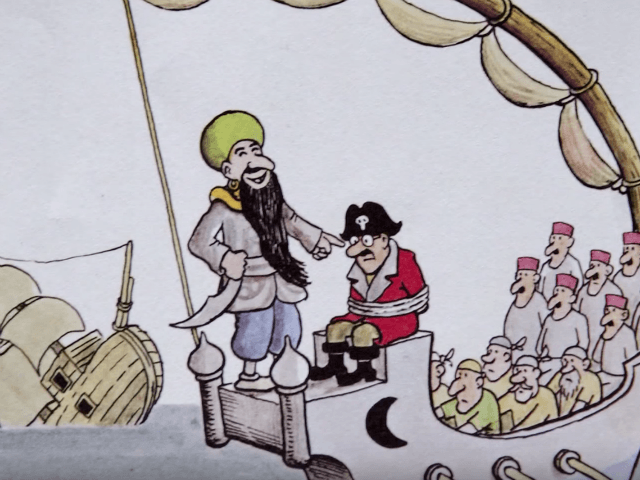Two books by one of Sweden’s most popular and decorated children’s authors may be withdrawn from circulation after an “investigation” revealed that they contained “stereotypical depictions of other cultures”. Jan Lööf was issued with an ultimatum: redraw the pictures, or have the books withdrawn.
The books in question are incredibly popular, and one – Catch Fabian – is sold out and will not be restocked, while publisher Bonnier Carlsen have withdrawn all 5,000 copies of the other – Grandpa is a Pirate – from sale. “They have given me an ultimatum. I either have to redraw the pictures or the books will not be published anymore,” the author told the newspaper Dagens Nyheter.
Grandpa is a Pirate, first published in 1966, is considered an integral part of children’s literature in Sweden, has having been translated into several languages and have even been distributed at McDonalds.
On Bokus.com, which lists the most popular books for each age range, Grandpa is a Pirate is at number three – but unlike the other books listed on the website, “buy” is no longer an option.
The objections the publishers have are that its main character meets a street seller named Abdullah and an evil pirate named Omar, pictured in the tweet below:
Varning för 'Morfar är sjörövare' – med bilder på "Omar och hans arabiska sjörövare". #svpol #pippigate #bokbål pic.twitter.com/MlwxRsISKT
— Inte naiv, men… (@Inte_Naiv_Men) September 30, 2014
The Local reported that the other book, Catch Fabian, published in 1997, “Has pictures of what appears to be a bongo drummer dressed in bangles, paint, a skirt, a headdress, and sunglasses. The rest of the band wear formal attire.” What The Local failed to mention was that, in the Dagens Nyheter interview, Mr Lööf explained the drummer was a friend of his, Rebop Kawku Baah, who died thirty years ago.
In discussions with the publisher over Catch Fabian, Mr Lööf was asked to re-draw illustrations the publisher deemed problematic, including: “the image of jazz musicians performing” and “that somebody wore sunglasses to go to bed”. He attempted some sketches, which were then deemed “not good enough”. Mr Lööf told the publisher that he had realised the task was “not possible” and subsequently was told that they would have to be put out of print.
The publisher’s spokeswoman categorically denied being “too afraid” to portray “uncomfortable topics”, saying instead that the decision to withdraw Grandpa is a Pirate was about “awareness and respectfulness to our younger readers”.
“For us, Jan and his writing is incredibly important,” the representative said. But apparently not as important as the “current debate” which is about “how, in a respectful manner, we take into account contemporary values and at the same time cultural heritage”.
If this were true then Bonnier Carlsen would have welcomed the book as it illustrates a the rarely portrayed but hugely historical role that Arabs played in the days of high piracy, as well as being a part of (now often forgotten) Swedish history: Sweden joining America in her first overseas war, which was fought against Barbary pirates. Barbary pirates, from four North African states known as the “Barbary States”, kidnapped American crews for ransom money, and kidnapped and enslaved more than one million Europeans, which prompted the two countries into war with the Barbary States.
Mr Lööf received the Schullströmska prize, which is awarded by the Swedish Academy every two years to an “outstanding writer of children’s books”, just last month. Previously he has been decorated with both the Lagerlöf Literature Prize and the Astrid Lindgren Prize, but the author says he will not be changing his books, saying:
“I’m 76 years old and can not be bothered to change. This is not about the money. But, I probably will not be doing any more books for children”.
The Local reported that: “There has been general support for Lööf on Sweden’s social media channels, with many social media users questioning whether censorship has gone too far”.
Having examined all recent tweets with the relevant hashtag, of 18 tweets referencing the controversy 16 strongly opposed the censorship.
One user jokes that the country “should burn all literature written before the 2000s”, another saying that a book called Pettson and Findus should be banned because it contains “unpleasant stereotypes” of forest farmers and cats.

COMMENTS
Please let us know if you're having issues with commenting.